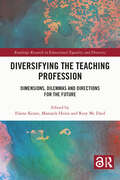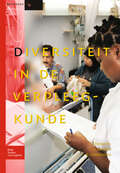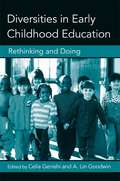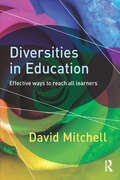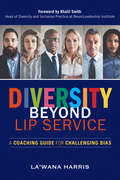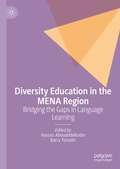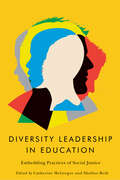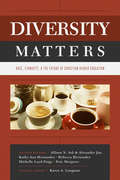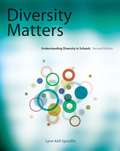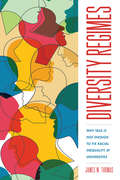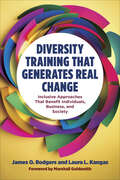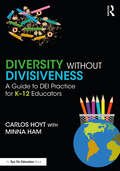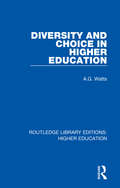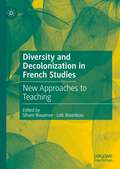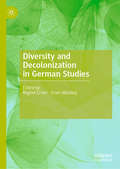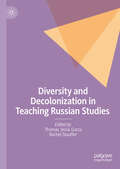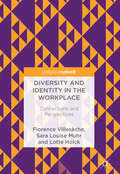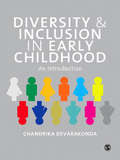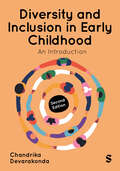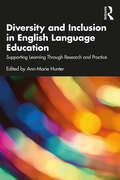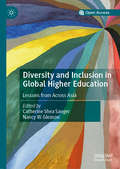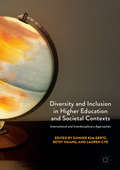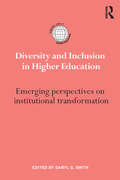- Table View
- List View
Diversifying the Teaching Profession: Dimensions, Dilemmas and Directions for the Future (Routledge Research in Educational Equality and Diversity)
by Elaine Keane Manuela Heinz Rory Mc DaidThis edited volume is about diversifying the teaching profession. It is unique in its inclusion of multiple dimensions of diversity; its chapters focus on a wide range of under-represented groups, including those from lower socio-economic groups, Black and minority ethnic groups, migrants, the Travelling community, the Deaf community, the LGBTQI+ community and those of mature age. The book includes contributions from Australia, England, Iceland, Portugal and Scotland, as well as a number of chapters from the Irish context, mostly emanating from projects funded under Ireland’s Higher Education Authority’s Programme for Access to Higher Education (PATH): Strand 1—Equity of Access to Initial Teacher Education. The book also critically engages the rationale for diversifying the profession, arguing not only that representation still matters, but also that ultimately teacher diversity work needs to encompass system transformation to achieve a diverse, equitable and inclusive teaching profession.
Diversifying the Teaching Profession: Dimensions, Dilemmas and Directions for the Future (Routledge Research in Educational Equality and Diversity)
by Elaine Keane Manuela Heinz Rory Mc DaidThis edited volume is about diversifying the teaching profession. It is unique in its inclusion of multiple dimensions of diversity; its chapters focus on a wide range of under-represented groups, including those from lower socio-economic groups, Black and minority ethnic groups, migrants, the Travelling community, the Deaf community, the LGBTQI+ community and those of mature age.The book includes contributions from Australia, England, Iceland, Portugal and Scotland, as well as a number of chapters from the Irish context, mostly emanating from projects funded under Ireland’s Higher Education Authority’s Programme for Access to Higher Education (PATH): Strand 1—Equity of Access to Initial Teacher Education.The book also critically engages the rationale for diversifying the profession, arguing not only that representation still matters, but also that ultimately teacher diversity work needs to encompass system transformation to achieve a diverse, equitable and inclusive teaching profession.The Open Access version of this book, available at http://www.taylorfrancis.com, has been made available under a Creative Commons Attribution-Non Commercial-No Derivatives (CC-BY-NC-ND) 4.0 license.
Diversiteit in de verpleegkunde
by P. Esterhuizen A.U. Kuckert-PanderVerpleegkundigen staan dicht bij mensen. Inlevingsvermogen en mensenkennis zijn onmisbaar voor goede observaties, klinisch redeneren of voor het kunnen geven van steun. Hoe herken je als verpleegkundige diversiteit en hoe geef je dat een goede plek in je handelen? Dit boek maakt de complexiteit van het onderwerp ‘diversiteit’ zichtbaar en biedt tegelijkertijd handvatten. Het boek laat zien hoe belangrijk de dialoog met patiënten is en hoe een verpleegkundige kennis over groepskenmerken kan combineren met het oog hebben voor unieke eigenschappen. Op het eerste oog homogene groepen patiënten kunnen veel diversiteit bevatten. De auteurs benaderen het onderwerp ‘diversiteit’ vanuit verschillende perspectieven. De complexiteit van het onderwerp wordt hierdoor goed zichtbaar. Dat diversiteit centraal staat in dit boek is niet alleen te zien aan de titel, maar ook aan de diversiteit in de opbouw van hoofdstukken. Elk hoofdstuk kan op zichzelf gelezen worden. Drie hoofdstukken zijn in de Engelse taal geschreven. Niet alleen de opbouw en de taal van de hoofdstukken is divers, maar ook de auteurs zelf verschillen in leeftijd, geslacht, gezinssituatie, opleiding (verpleegkunde, culturele antropologie, sociologie, etc.) en woonplaats (Nederland, Duitsland, Groot-Brittannië, Amerika).
Diversities in Early Childhood Education: Rethinking and Doing (Changing Images of Early Childhood)
by A. Lin Goodwin Celia GenishiThis collection, edited by leaders in the field of early childhood and multicultural education, is a valuable resource for those studying and working with young children. Chapters emphasize the relationship between theory, research, and practice, and provide illustrations of equitable and inclusive practices that move us toward social justice in the critical field of early childhood education. Drawing from the current literature on ability, class, culture, ethnicity, gender, languages, race, and sexual orientation, the book presents a forward-looking account of how diversity could improve the educational experience of children from birth to grade three.
Diversities in Education: Effective ways to reach all learners
by David MitchellDiversities in Education is a challenging text that will help educators, teacher educators and trainee teachers to be more effective in teaching a range of diverse learners. It covers five major categories of difference: sex and gender; social class and socio-economic status; race, ethnicity and culture; beliefs and religion; and different abilities and asks the urgent questions all policy-makers, educators and students should consider: Why should we value diversity and human rights? How can inclusive education accommodate diversity? How do society’s aspirations for cohesion and harmony impact on people who are different? What meanings are given to differences, culturally and historically? Should educators seek to accentuate, eliminate, reduce or ignore differences? By drawing attention to the latest research into the most effective educational policies and practices, this insightful book suggests strategies for meeting the challenges being posed in an era of superdiversity. It’s a crucial read for any training or practising educator who wants to address the issue of diversity, learn effective ways to reach all learners and create more inclusive and harmonious societies.
Diversity Beyond Lip Service: A Coaching Guide for Challenging Bias
by La'Wana Harris"La'Wana Harris has opened this coach's eyes to the power of coaching practices to create new paths for diversity and inclusion work—whether or not you are formally trained as a coach. Please read this book and help create workplaces with honest engagement and access for all." —Marshall Goldsmith, Thinkers 50 #1 Executive Coach and two-time #1 Leadership Thinker in the worldThe ugly truth about diversity is that some people worry they must give up their power for others to have a chance. La'Wana Harris's Inclusion Coaching method helps people realize that sharing power isn't the same as losing it. The elephant in the room with diversity work is that people with privilege must use it to allow others equal access to power. This is often why diversity efforts falter—people believe in diversity until they feel that they have to give something up. How do we talk them through this shift?La'Wana Harris introduces Inclusion Coaching, a new tool based on cutting-edge research that identifies the stages of preparation, implementation, and "self-work" necessary to help individuals, teams, and organizations build a sustainable culture of inclusion. Harris's six-stage COMMIT model—Commit to courageous action, Open your eyes and ears, Move beyond lip service, Make room for controversy and conflict, Invite new perspectives, and Tell the truth even when it hurts—provides a proven process for making people aware of their own conscious and unconscious biases and concrete steps to make inclusion an embedded reality. Harris offers managers and diversity coaches new models to empower everyone from employees to CEOs to "do" inclusion and address deep-rooted biases that are often invisible. She addresses the growing need to challenge bias and build authentic cultures where everyone can feel a sense of belonging.
Diversity Education in the MENA Region: Bridging the Gaps in Language Learning
by Barry Tomalin Hassan AbouabdelkaderThis book outlines a landscape of diversity education in the MENA region and its repercussions on learners' abilities, outcomes, and prospects. It addresses the concerns of language educators, curriculum designers, language education researchers, students and trainers. Theoretically, the issues of diversity, inclusion and equity share common principles and insights; yet they are not conceived of in this book as interchangeable. These subtle distinctions, as delineated in this book, show that they are complementary and include the principles of quality education which leverage human rights, sustainability and promotion of the human capital. What makes this book distinctive is that it reconsiders the existing pedagogical trends in terms of the current social upheavals, and with reference to the principles of development and progress needed in twenty-first century education.
Diversity Leadership in Education: Embedding Practices of Social Justice
by Catherine McGregor, Shailoo BediWidely understood to be the best tool of social change, education offers a space to interrogate persistent and damaging oppressions, calling into question the cultural and political antecedents, as well as the current politics and practices, that have facilitated inequity. Educational leaders themselves, however, have much to learn about dismantling systems that maintain these barriers.Diversity Leadership in Education offers a deep look into the complexities and opportunities afforded by new models of diversity leadership. Authors from across North America explore how diverse leaders are key to improving the school experience for marginalized students. Indigenous, Black, racialized, and collaborative forms of leadership contribute to decolonizing educational settings by unsettling hegemonic ideas; these include the dominance of equity myths in educational administration and pedagogical whitewashing around issues germane to social justice.Unpacking privilege in education systems, the volume speaks to incorporating social justice in everyday leadership practices through advocacy, solidarity, spirituality, relationality, and reconciliation. It profiles diversity leadership as a rudder, steering a more inclusive and equitable society.
Diversity Matters: Race, Ethnicity, and the Future of Christian Higher Education
by Karen A. LongmanToday, no institution can ignore the need for deep conversations about race and ethnicity. But colleges and universities face a unique set of challenges as they explore these topics. Diversity Matters offers leaders a roadmap as they think through how their campuses can serve all students well.Five Key SectionsCampus Case Studies: Transforming Institutions with a Commitment to DiversityWhy We Stayed: Lessons in Resiliency and Leadership from Long-Term CCCU Diversity ProfessionalsVoices of Our Friends: Speaking for ThemselvesCurricular/Cocurricular Initiatives to Enhance Diversity Awareness and ActionAutoethnographies: Emerging Leaders and Career Stages Each chapter in Diversity Matters includes important discussion questions for administration, faculty, and staff.
Diversity Matters: Understanding Diversity in Schools (What's New in Education)
by Lynn SpradlinThere is no single "cookbook" approach to working effectively with a diverse classroom population--and that's why this book is so useful. Its practical, research-based approach prepares educators to meet the unique demands of their intercultural interactions armed with knowledge that assures proper, responsive, and ethical intercultural communication. Based on current research and enriched by the individual voices of those with diverse worldviews, the book provides abundant practical, theoretically sound approaches for addressing the needs of those who are marginalized in today's classroom. Designed to engage readers intellectually and emotionally, this distinctive book will move you from the realm of understanding (head), through personal valuing (heart), and finally to applying (voice) the information provided.
Diversity Regimes: Why Talk Is Not Enough to Fix Racial Inequality at Universities (The American Campus)
by James M. ThomasAs a major, public flagship university in the American South, so-called “Diversity University” has struggled to define its commitments to diversity and inclusion, and to put those commitments into practice. In Diversity Regimes, sociologist James M. Thomas draws on more than two years of ethnographic fieldwork at DU to illustrate the conflicts and contingencies between a core set of actors at DU over what diversity is and how it should be accomplished. Thomas’s analysis of this dynamic process uncovers what he calls “diversity regimes”: a complex combination of meanings, practices, and actions that work to institutionalize commitments to diversity, but in doing so obscure, entrench, and even magnify existing racial inequalities. Thomas’s concept of diversity regimes, and his focus on how they are organized and unfold in real time, provides new insights into the social organization of multicultural principles and practices.
Diversity Training That Generates Real Change: Inclusive Approaches That Benefit Individuals, Business, and Society
by James O Rodgers Laura L KangasThis complete guide to effective, transformative diversity training provides an answer to the superficial, check-the-box DEI efforts that are undermining the entire field.DEI work is getting a bad reputation. But that's because it's not being done right, say veteran diversity consultants James O. Rodgers and Laura Kangas. Too many organizations are treating diversity training as a quick-hit, low-cost, check-the-box activity. Effective diversity training involves behavioral change based on adult learning theory. It is rigorous, deeply personal, experience based, and, if done well, life changing. Rodgers and Kangas offer a complete guide, from design to implementation to results. They show how to• determine what specific, tangible outcomes an organization wants before it starts• link diversity training to overall organizational strategy• help all participants forge an individual, emotional connection to the training• identify what skills a facilitator needs—the right facilitator makes all the difference• create memorable learning experiences, not simply educational programs The authors' goal is nothing less than to spark a worldwide revolution of informed practitioners, employees, and business leaders who will demand diversity training be given the same time, resources, and attention as any other critical enterprise initiative.Reading group discussion guide available in book.
Diversity Without Divisiveness: A Guide to DEI Practice for K-12 Educators
by Carlos Hoyt Minna HamDiversity Without Divisiveness: A Guide to DEI Practice for K-12 Educators provides frameworks and tools to help you move beyond the buzzwords and truly practice DEI by fostering a shared vision for inclusive education.Written by two educators with rich backgrounds in DEI practice and training, this book shows how to promote inclusivity without falling into partisan promotion of prescribed beliefs. Hoyt and Ham address common misunderstandings, explain the crucial interaction between DEI and SEL, and provide language for addressing parents’ concerns about DEI. The authors also invite educators to tackle DEI challenges in K-12 education: Should students be assigned to “affinity groups”? How can DEI be integrated into curricula? What are some tools for DEI professional development? How can we mitigate objections from those feeling threatened by DEI values?The book offers a plethora of tools to ensure that DEI is not just an ideal to strive for but a tangible reality within every classroom. There are also firsthand accounts from educators who are actively engaging with DEI in impactful ways. With Hoyt and Ham’s tangible solutions, you’ll be able to chart a course for a more inclusive and equitable school.
Diversity and Choice in Higher Education (Routledge Library Editions: Higher Education #32)
by A.G. WattsOriginally published in 1972 Diversity and Choice in Higher Education focuses on the diversity of institutions and the corresponding notion that students should be allowed to choose freely between them, regardless of distance from home. The book includes an exhaustive assessment of relevant research evidence, not only from Britain but also from the United States and other countries. The author examines such topics as the amount of diversity and choice permitted in the higher education systems of different countries, the extent to which the British system is diversified and the way in which students are distributed within it. He also explores certain hypotheses relating to the way pupils make their choice, examines critically the concept of matching students to institutions and discusses alternative models of student distribution.
Diversity and Decolonization in French Studies: New Approaches to Teaching
by Loïc Bourdeau Siham BouamerThis edited volume presents new and original approaches to teaching the French foreign-language curriculum, reconceptualizing the French classroom through a more inclusive lens. The volume engages with a broad range of scholars to facilitate an understanding of the process of French (de)colonization as well as its reverberations into the postcolonial era, and a deeper engagement with the global interconnectedness of these processes. Chapters in Part I revist the concept of the "francophonie," decenter the field from “metropolitan” or “hexagonal” and white France and underline how current teaching materials reproduce epistemic and colonial violence. Part II adopts an intersectional approach to address topics of gender inclusivity, trans-affirming teaching, queer materials, and ableism. Finally, Part III presents new ways to transform the discipline by affirming our commitment to social justice and making sure that our classrooms are representative of our students’ enriching diversity.
Diversity and Decolonization in German Studies
by Regine Criser Ervin MalakajThis book presents an approach to transform German Studies by augmenting its core values with a social justice mission rooted in Cultural Studies. German Studies is approaching a pivotal moment. On the one hand, the discipline is shrinking as programs face budget cuts. This enrollment decline is immediately tied to the effects following a debilitating scrutiny the discipline has received as a result of its perceived worth in light of local, regional, and national pressures to articulate the value of the humanities in the language of student professionalization. On the other hand, German Studies struggles to articulate how the study of cultural, social, and political developments in the German-speaking world can serve increasingly heterogeneous student learners. This book addresses this tension through questions of access to German Studies as they relate to student outreach and program advocacy alongside pedagogical models.
Diversity and Decolonization in Teaching Russian Studies
by Thomas Jesús Garza Rachel StaufferThis edited volume is the first to address diversity and decolonization in teaching Russian language, literature, and culture. For multicultural scholars and classrooms in both K-12 and higher education, the editors aim to expand representations of Russian speaker identities and Russian-speaking communities outside of Russia, as well as the culturally- and linguistically- diverse identities of students and scholars specializing in Russian within the US. Contributions provide concrete examples and philosophical approaches to present alternative ways to transform content and instruction in Russian Studies.
Diversity and Identity in the Workplace: Connections and Perspectives
by Florence Villesèche Sara Louise Muhr Lotte HolckExamining the theoretical connections between identity and diversity, this new book explores how diversity management practices can be better informed by an enhanced understanding of the relationship between the two fields. Highlighting the relevance of identity to diversity studies, the authors concentrate on three key areas: social identity theory; critical perspectives on identity; and poststructuralist understandings. With the aim of fueling future research, this insightful book outlines a detailed research agenda and offers practical suggestions. Not only useful to academics, this book also seeks to encourage policy-makers and HR managers to develop current practices and make more research-informed management decisions.
Diversity and Inclusion in Early Childhood: An Introduction
by Chandrika DevarakondaCovering a wide range of concepts and taking a broader perspective of what inclusion entail, this book offers an overview of current research, policy and practice in diversity and inclusion in the early years. It is a clear introduction to what inclusive practice means for those working with young children in the early stages of their lives. With case studies and activities designed to help students relate to diverse situations, the author discusses the main issues surrounding: - race - gender - culture - disability and Special Educational Needs - English as an Additional Language - Traveller children - the contexts of inclusion and exclusion - good practice in early childhood settings - different perspectives of inclusion This is essential reading for students studying inclusion and diversity on early childhood or early years courses, and those seeking to promote good practice and enable all children to develop to their full potential irrespective of their background. 'The success of this book is in its ability to explore inclusion from a wide perspective. Offering a range of thought-provoking material, such as reflective questions, debates and controversies, practitioner, parent and children's views, legislation, activities, and examples of good practice, will keep readers interested and actively engaged throughout the book'-Dr Anna Kilderry, Senior Lecturer, Early Childhood Education, Victoria University, Melbourne, Australia Chandrika Devarakonda is a Senior Lecturer in the Faculty of Education and Children's Services at the University of Chester.
Diversity and Inclusion in Early Childhood: An Introduction
by Chandrika DevarakondaCovering a range of concepts and taking a broad perspective of what inclusion entails, this book offers an overview of current research, policy, and practice in diversity and inclusion in the early years. With case studies and activities designed to help students relate to diverse situations, the author discusses topics ranging from race, gender, and culture, to SEND and traveller children. This updated edition contains: * New chapter on Intersectionality * New chapter on Poverty & Inclusion * New chapter on Medical Needs & Inclusion * Revised references to policy and legislation * Updated content throughout to fit contemporary contexts
Diversity and Inclusion in Early Childhood: An Introduction
by Chandrika DevarakondaCovering a range of concepts and taking a broad perspective of what inclusion entails, this book offers an overview of current research, policy, and practice in diversity and inclusion in the early years. With case studies and activities designed to help students relate to diverse situations, the author discusses topics ranging from race, gender, and culture, to SEND and traveller children. This updated edition contains: * New chapter on Intersectionality * New chapter on Poverty & Inclusion * New chapter on Medical Needs & Inclusion * Revised references to policy and legislation * Updated content throughout to fit contemporary contexts
Diversity and Inclusion in English Language Education: Supporting Learning Through Research and Practice
by Ann-Marie HunterThis edited volume takes an expansive, no-nonsense view of the spectrum of English language learners to address their varied backgrounds and their wide range of needs, worries, motivations, and abilities. Each chapter addresses a key area and group of students to enable English language teachers to come away with the knowledge and skills they need to support their students. The contributors, who represent a diverse range of voices themselves, cover essential topics, including dyslexia, neurodiversity, linguistic inclusion, deaf students, LGBTQI+ students, racial and cultural inclusion, and more. Accessible and grounded in cutting-edge research, this book features key concepts, methodologies, and strategies that will encourage reflection and inclusive pedagogy. An invaluable resource for students, researchers, and professionals, this volume demonstrates how English language education can be a force for transformative change and social inclusion.
Diversity and Inclusion in Global Higher Education: Lessons from Across Asia
by Nancy W. Gleason Catherine Shea SangerThis open access book offers pioneering insights and practical methods for promoting diversity and inclusion in higher education classrooms and curricula. It highlights the growing importance of international education programs in Asia and the value of understanding student diversity in a changing, evermore interconnected world. The book explores diversity across physical, psychological and cogitative traits, socio-economic backgrounds, value systems, traditions and emerging identities, as well as diverse expectations around teaching, grading, and assessment. Chapters detail significant trends in active learning pedagogy, writing programs, language acquisition, and implications for teaching in the liberal arts, adult learners, girls and women, and Confucian heritage communities. A quality, relevant, 21st Century education should address multifaceted and intersecting forms of diversity to equip students for deep life-long learning inside and outside the classroom. This timely volume provides a unique toolkit for educators, policy-makers, and professional development experts.
Diversity and Inclusion in Higher Education and Societal Contexts
by Betsy Huang SunHee Kim Gertz Lauren CyrGroundbreaking in its international, interdisciplinary, and multi-professional approach to diversity and inclusion in higher education, this volume puts theory in conversation with practice, articulates problems, and suggests deep-structured strategies from multiple perspectives including performed art, education, dis/ability studies, institutional as well as government policy, health humanities, history, jurisprudence, psychology, race and ethnicity studies, and semiotic theory. The authors--originating from Austria, Germany, Luxembourg, Trinidad, Turkey, and the US-- invite readers to join the conversation and sustain the work.
Diversity and Inclusion in Higher Education: Emerging perspectives on institutional transformation (International Studies in Higher Education)
by Daryl G. SmithIn addition to many other issues that touch higher education around the world, diversity and equity in higher education is fast becoming a major opportunity and challenge to institutions, countries and regions. The increasing centrality of diversity is fueled in part by changing demographics, immigration, social movements, calls for remedies to historic grievances, and the relationship between identity and access to power. This book will provide an opportunity to look at efforts at institutional change with respect to diversity in several countries where issues of diversity are moving beyond simply access for diverse populations to efforts at institutional transformation. Its purpose is to provide a comparative perspective with the hope that we will be able to see patterns across these contexts from which we might learn. Amongst other subjects it will address: The historic and contemporary context for diversity Established and emerging salient identities How diversity is framed at a national and institutional level The prevailing strategies and policies for engaging diversity, again at the national and institutional level The role of special purpose institutions This critical book is essential for higher education scholars and practitioners with backgrounds in higher education.
